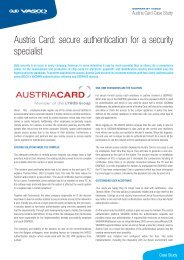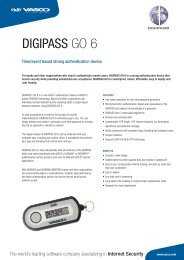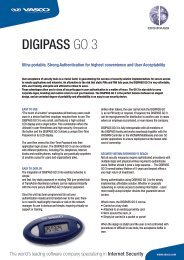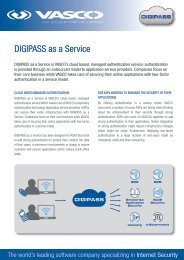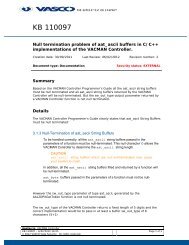Digipass Plug-In for SBR Administrator Reference - Vasco
Digipass Plug-In for SBR Administrator Reference - Vasco
Digipass Plug-In for SBR Administrator Reference - Vasco
You also want an ePaper? Increase the reach of your titles
YUMPU automatically turns print PDFs into web optimized ePapers that Google loves.
<strong>Digipass</strong> <strong>Plug</strong>-<strong>In</strong> <strong>for</strong> <strong>SBR</strong> <strong>Administrator</strong> <strong>Reference</strong> ODBC Database<br />
Foreign Keys:<br />
(vdsDomain) references vdsDomain<br />
(vdsDomain, vdsParentOrgUnit) references vdsOrgUnit<br />
3.4 Encoding and Case-Sensitivity<br />
When you create the database, depending on the database type, you may have the chance to<br />
select a collation sequence. The collation sequence determines both the sort order and the<br />
case-sensitivity of the database. If you do not have the chance to select the collation<br />
sequence, it is advisable to find out how it is already defined.<br />
The encoding used by the database is important when considering support <strong>for</strong> non-English<br />
languages. You must ensure that the database will be able to store the data in whatever<br />
languages may be used in your system.<br />
Case-sensitivity is of particular importance when looking up a <strong>Digipass</strong> User Account. It<br />
determines whether the user must get the correct case <strong>for</strong> their UserId when logging in. For<br />
example, if your database collation sequence is case-sensitive, user “JSmith” would have to log<br />
in as exactly “JSmith”, not “jsmith”. If you want a case-insensitive User ID and domain lookup,<br />
and your database does not behave this way by default, you have two choices:<br />
Choose a case-insensitive collation sequence <strong>for</strong> the database.<br />
Use a configuration option in <strong>Digipass</strong> <strong>Plug</strong>-<strong>In</strong> <strong>for</strong> <strong>SBR</strong> to convert User ID and domain<br />
names to all upper or all lower case. See 11.1.7.3 User ID and Domain Conversion<br />
<strong>for</strong> more in<strong>for</strong>mation.<br />
Caution<br />
Configuration settings <strong>for</strong> case-sensitivity must be set up in the Configuration<br />
GUI be<strong>for</strong>e data is entered into the database.<br />
The Master Domain (named 'master') is an exception, as it is created in the<br />
database when the dpdbadmin addschema command is run. If you will be<br />
configuring the <strong>SBR</strong> <strong>Plug</strong>-<strong>In</strong> to convert User IDs and domains to upper case,<br />
change the name of the Master Domain be<strong>for</strong>e changing the case settings. See<br />
3.5.1.1 Master Domain <strong>for</strong> more in<strong>for</strong>mation.<br />
The embedded database created by the installation program uses UTF-8 encoding. <strong>In</strong> addition,<br />
as this results in case-sensitive collation, the option to convert User IDs and domain names to<br />
lower case is set by default.<br />
3.5 Domains and Organizational Units<br />
The concepts of Domain and Organizational Unit are present in <strong>Digipass</strong> <strong>Plug</strong>-<strong>In</strong> <strong>for</strong> <strong>SBR</strong> <strong>for</strong><br />
the purpose of grouping users. They closely match the concepts of the same names in Active<br />
Directory/LDAP, but they are not identical.<br />
© 2006 VASCO Data Security <strong>In</strong>c. 47



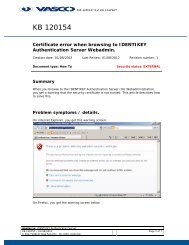

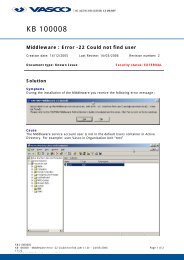

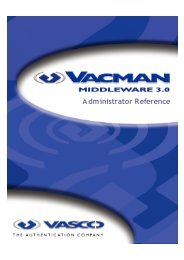
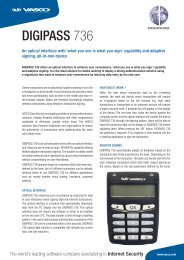
![KB [100006] - Vasco](https://img.yumpu.com/12539350/1/184x260/kb-100006-vasco.jpg?quality=85)
